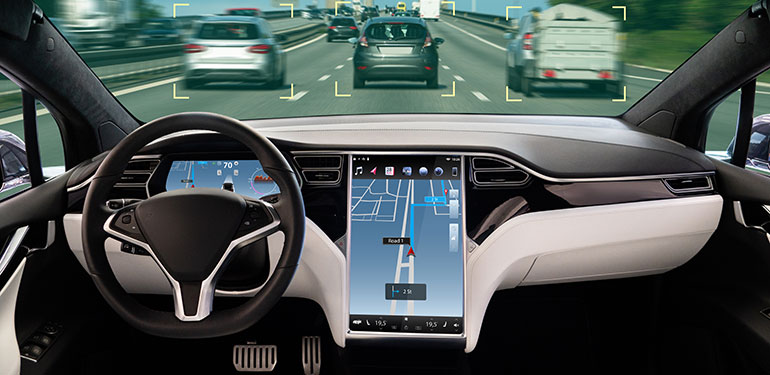Overview / Careers in RoboticsRobotics Careers in Transportation
Driverless cars have been in the public eye for two decades, promising robotic chauffeurs for the general public. As the field has matured, the technical challenges in navigation and perception have become clearer, and many manufacturers now see robotic technologies as assisting a human driver rather than replacing one. This perspective brings more opportunities, but it also introduces new challenges, including keeping a driver engaged while a car performs most basic driving functions. Other innovations in the industry include introducing urban infrastructure, such as sensors and beacons, that help driverless cars become more reliable under a greater set of circumstances.
How would a roboticist function in this industry?
Engineers in this field are working to make the dream of ubiquitous safe and simple transportation a reality. To be a roboticist involved with transportation requires skills related to navigation, machine learning, and computer vision in order to help make vehicles drive autonomously. The field can be stressful, particularly as a major focus is placed on safety and reliability since people's lives will be dependent on the code a roboticist writes.
How does MSR prepare students for this field?
Rather than learning about transportation solely through datasets and simulation, MSR students have unfettered access to many of the sensors that power self-driving cars, such as 3D cameras and light detection and ranging (Lidar), as well as mobile robots. These tools allow students to learn about autonomous transportation through hands-on experience.
How is robotics used / applied in this industry?
When it comes to robotics and transportation, the focus often turns to self-driving vehicles. Currently there are robotics opportunities at a host of companies that focus on self-driving cars, boats, trains, buses, and trucks.
Where our students have interned or our alumni have worked
- BMW
- Daimler
- Honda
- Luminar Technologies
- PlusAI
- Waymo
- Zoox
Featured Alumni

Rikki Valverde
MSR ' 16, Senior engineer, Daimler Trucks North America (DTNA)The idea that autonomous vehicles are not as safe as ones with human drivers is a common misconception, according to Rikki Valverde.
"Autonomous vehicles never get drowsy or distracted, they have better night vision, and they benefit from the analysis and planning of teams of engineers instead of relying on one human in a possible moment of stress," Valverde said.
Valverde is one of those engineers. She learned all about complex systems during her time in MSR and incorporates lessons she learned in control theory while working to create an automated tractor trailer that will not require human drivers to take over the wheel.

Guilherme Klink
MSR '16, Software engineer at BMWGuilherme Klink works at BMW, where his focus is on machine learning. Specifically, he develops ways to teach machines to automate complicated tasks in order to enhance the driver's experience.
"My goal is to increase convenience, safety and, in some cases, to enable the driver to only focus on having sheer driving pleasure," Klink said.
With an office located in Silicon Valley, Klink spends much of his time discovering the latest technologies developed by startups and major tech companies and exploring how they could potentially be incorporated into his own projects. It's a job that requires a lot of trial and error, something he learned to do in MSR.
"I became quite a good tinkerer, a skill that I completely lacked before MSR but that now helps me a lot when prototyping," he said.


